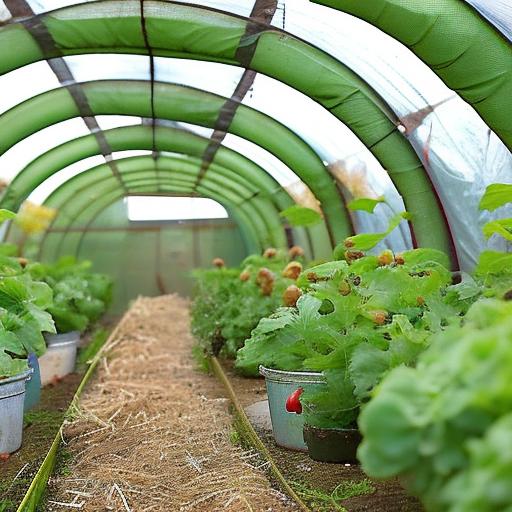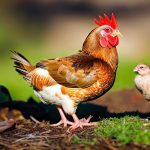Keeping chickens in a polytunnel is a popular and effective method of poultry farming. A polytunnel is a structure made of polyethylene that provides protection from the elements and predators, making it an ideal environment for raising chickens. This article will discuss the advantages of keeping chickens in a polytunnel, how to choose the right polytunnel for your chickens, and provide tips for successfully raising chickens in this type of environment.
Key Takeaways
- Keeping chickens in a polytunnel provides a safe and secure environment for them to roam and forage.
- Choosing the right size and material for your polytunnel is important for the health and comfort of your chickens.
- Proper preparation of the polytunnel, including cleaning and insulation, is crucial for the well-being of your chickens.
- Free-range chickens in a polytunnel have access to fresh air, sunlight, and a variety of plants and insects to eat.
- Providing clean water and a balanced diet is essential for the health of your chickens, and regular cleaning and disinfecting helps prevent disease.
Advantages of keeping chickens in a polytunnel
One of the main advantages of keeping chickens in a polytunnel is the protection it provides from the elements. The polyethylene material acts as a barrier against rain, wind, and extreme temperatures, creating a more stable and comfortable environment for the chickens. This can help to reduce stress and improve overall health and productivity.
Another advantage is the protection from predators that a polytunnel offers. Chickens are vulnerable to attacks from predators such as foxes, raccoons, and birds of prey. By keeping them in a polytunnel, you can create a secure space where they can roam freely without the risk of being attacked. This can give you peace of mind knowing that your chickens are safe and protected.
Choosing the right polytunnel for your chickens
When choosing a polytunnel for your chickens, there are several factors to consider. The size of the polytunnel should be large enough to accommodate the number of chickens you plan to keep, allowing them enough space to move around comfortably. It’s also important to consider the material of the polytunnel. Polyethylene is a common choice due to its durability and resistance to UV rays, but there are also other materials available such as PVC or metal frames with plastic covers.
Preparing the polytunnel for your chickens
Before introducing your chickens to the polytunnel, it’s important to prepare the space properly. Start by adding bedding material to the floor of the polytunnel. This can be straw, wood shavings, or any other suitable material that provides a comfortable and absorbent surface for the chickens. Next, set up nesting boxes where the chickens can lay their eggs. These should be filled with clean straw or shavings to provide a cozy and inviting space for egg-laying.
The benefits of free-range chickens in a polytunnel
Allowing your chickens to free-range in the polytunnel has several benefits. Firstly, it provides them with increased exercise and stimulation. Chickens are naturally curious and active animals, and giving them space to roam and explore can help to keep them happy and healthy. Secondly, free-ranging in the polytunnel allows the chickens access to fresh grass and vegetation, which can supplement their diet and provide additional nutrients.
Feeding and watering your chickens in a polytunnel

Feeding and watering your chickens in a polytunnel is an important aspect of their care. It’s recommended to use a gravity-fed waterer that provides a constant supply of fresh water for the chickens. This ensures that they have access to water at all times, which is essential for their health and well-being. When it comes to feeding, it’s important to provide a balanced diet that includes a mix of grains, protein, and fresh fruits and vegetables. This can be supplemented with commercial chicken feed or homemade feed mixes.
Maintaining hygiene and cleanliness in a polytunnel
Maintaining hygiene and cleanliness in the polytunnel is crucial for the health of your chickens. Regularly clean out the bedding material and replace it with fresh material to prevent the buildup of waste and bacteria. It’s also important to regularly clean the nesting boxes and remove any soiled bedding or eggs. Additionally, regularly disinfecting the polytunnel with a poultry-safe disinfectant can help to prevent the spread of diseases and parasites.
Providing adequate ventilation for your chickens in a polytunnel
Proper ventilation is essential for the health and well-being of your chickens in a polytunnel. Good airflow helps to remove excess moisture, ammonia, and odors from the space, which can help to prevent respiratory issues and other health problems. To provide adequate ventilation, consider installing vents or windows in the polytunnel that can be opened or closed as needed. It’s also important to monitor the temperature inside the polytunnel and make adjustments as necessary to ensure a comfortable environment for the chickens.
Protecting your chickens from predators in a polytunnel
While a polytunnel provides protection from many predators, there are still some that may pose a threat to your chickens. It’s important to take steps to protect them from these potential threats. This can include installing fencing around the polytunnel to keep out larger predators such as foxes or raccoons. You can also use netting or wire mesh to cover any openings or gaps in the polytunnel to prevent birds of prey from entering. Regularly inspect the polytunnel for any signs of damage or weakness that could allow predators to gain access.
Common mistakes to avoid when keeping chickens in a polytunnel
There are several common mistakes that people make when keeping chickens in a polytunnel. One of the most common is overcrowding. It’s important to provide enough space for the chickens to move around comfortably and exhibit natural behaviors. Overcrowding can lead to stress, aggression, and an increased risk of disease transmission. Another common mistake is not providing enough ventilation. Poor airflow can lead to respiratory issues and other health problems for the chickens. It’s important to regularly monitor the temperature and airflow inside the polytunnel and make adjustments as necessary.
Tips for successful chicken keeping in a polytunnel
To ensure successful chicken keeping in a polytunnel, there are several additional tips to keep in mind. Firstly, regularly monitor the health and behavior of your chickens. This can help you to identify any potential issues or illnesses early on and take appropriate action. Secondly, provide plenty of enrichment and stimulation for your chickens. This can include things like perches, dust baths, and toys to keep them entertained and engaged. Lastly, regularly clean and maintain the polytunnel to ensure a clean and hygienic environment for your chickens.
Keeping chickens in a polytunnel offers many benefits, including protection from the elements and predators. By choosing the right polytunnel, preparing it properly, and providing adequate care and maintenance, you can create a safe and comfortable environment for your chickens to thrive. Whether you’re a beginner or an experienced chicken keeper, trying out this method of poultry farming can be a rewarding and enjoyable experience. So why not give it a try and see the benefits for yourself?
If you’re considering keeping chickens in a polytunnel, you may also be interested in exploring some creative ideas for chicken coop interiors. From cozy nesting boxes to innovative feeding stations, the article “Chicken Coop Interior Ideas” offers a range of inspiration to help you create a comfortable and functional space for your feathered friends. Additionally, if you’re looking for tips on building a large chicken coop, the article “Large Chicken Coop Ideas” provides valuable insights and design suggestions. And don’t forget to pay attention to the floor of your chicken coop! The article “Floor of Chicken Coop” discusses different flooring options and their benefits. For more information on these topics, check out Poultry Wizard’s website.
FAQs
What is a polytunnel?
A polytunnel is a type of greenhouse made of a metal frame covered with a polyethylene sheet. It is used to protect plants from harsh weather conditions and extend the growing season.
Can you keep chickens in a polytunnel?
Yes, you can keep chickens in a polytunnel. However, there are some factors to consider such as ventilation, space, and hygiene.
What are the benefits of keeping chickens in a polytunnel?
Keeping chickens in a polytunnel can provide them with a warm and sheltered environment, protection from predators, and access to fresh greens and insects for foraging.
What are the drawbacks of keeping chickens in a polytunnel?
Some of the drawbacks of keeping chickens in a polytunnel include the potential for poor ventilation, the buildup of ammonia from chicken droppings, and the risk of disease if hygiene is not maintained.
How can you ensure proper ventilation in a polytunnel for chickens?
You can ensure proper ventilation in a polytunnel for chickens by installing vents or windows that can be opened and closed as needed. It is also important to avoid overcrowding the space with too many chickens.
How much space do chickens need in a polytunnel?
Chickens need at least 4 square feet of space per bird in a polytunnel. However, more space is always better to ensure their comfort and well-being.
How can you maintain hygiene in a polytunnel with chickens?
You can maintain hygiene in a polytunnel with chickens by regularly cleaning out their bedding and droppings, providing fresh water and food, and disinfecting the space as needed.
Meet Walter, the feathered-friend fanatic of Florida! Nestled in the sunshine state, Walter struts through life with his feathered companions, clucking his way to happiness. With a coop that’s fancier than a five-star hotel, he’s the Don Juan of the chicken world. When he’s not teaching his hens to do the cha-cha, you’ll find him in a heated debate with his prized rooster, Sir Clucks-a-Lot. Walter’s poultry passion is no yolk; he’s the sunny-side-up guy you never knew you needed in your flock of friends!







